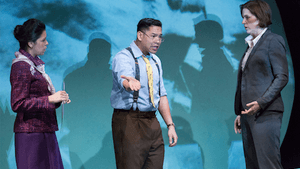Stay in the Loop
BSR publishes on a weekly schedule, with an email newsletter every Wednesday and Thursday morning. There’s no paywall, and subscribing is always free.
Science on stage
Lantern Theater presents Deborah Zoe Laufer's 'Informed Consent'

The challenge of issue-driven drama is to disguise the debate with genuine characters. A good playwright, as Deborah Zoe Laufer proves herself to be with Informed Consent, will make issues come to life through engaging people with personal stakes in the conflict.
In this Lantern Theater Company area premiere, Kittson O’Neill plays Jillian, a genetic anthropologist mapping human genome sequences in order to pinpoint and eradicate hereditary conditions. She has one of her own – early-onset Alzheimer’s, which killed her mother – and her clock is ticking: She wants to find a cure before she’s ravaged by the disease.
Storytelling, not lecture
Laufer uses effective storytelling techniques to deliver considerable scientific exposition without resorting to lecture. The members of director Kathryn MacMillan’s ensemble play multiple roles but are also always actors, volunteering to play parts and cutting one another off when someone digresses. The method comes across as self-consciously theatrical, but provides some humor and sets a brisk pace.
The challenge for the writer, and for us, is that there’s much to explain, including a disappearing Native American tribe in the Grand Canyon whose “unpolluted DNA” will help Jillian’s efforts. She negotiates to collect their blood, which they consider sacred, for a diabetes study, but collides with the “informed consent” concept when she assumes she can use the blood for her own purposes.
Informed Consent bogs down, despite the production’s best efforts, as more and more layers are revealed. Several culture clashes, including Jillian’s dismissal of the tribe’s beliefs as “myth,” must be explained. Then Laufer adds Jillian’s family life, including social awkwardness with her black husband: “There are no genes that indicate race,” she explains, but race exists nevertheless. Their four-year-old daughter might have the Alzheimer’s gene as well. Then the university sponsoring her work raises legal issues. Laufer based the play on a landmark court case, and real life is seldom tidy.
Characters come to life
The connections between the five actors help make the characters and issues clear. O’Neill is sympathetic yet maddening as the driven scientist who lacks social instincts and empathy. Lindsay Smiling plays her patient husband. Samantha Bowling is not only their daughter but, as the tribe’s liaison, bridges the gap between ancient customs and modern culture. Maria Konstantinidis plays Jillian’s mother, filtered through her childhood memories, as well as a university dean. Justin Jain adds humor as both a doddering old professor and a precocious toddler. MacMillan keeps them moving on Lance Kniskern’s boldly abstract set, enlivened by Nicholas Hussong’s science-y projections.
Along with the Wilma Theater’s Constellations, Informed Consent explains complicated science with clarity and economy while exploring relatable human situations. Together, they show that theater can guide us into the future.
What, When, Where
What-when-where: Informed Consent. By Deborah Zoe Laufer. Kathryn MacMillan directed. Through February 12, 2017, at the Lantern Theater Company, St. Stephen's Theater, 10th and Ludlow Streets, Philadelphia. (215) 829-03895 or lanterntheater.org.
Sign up for our newsletter
All of the week's new articles, all in one place. Sign up for the free weekly BSR newsletters, and don't miss a conversation.

 Mark Cofta
Mark Cofta